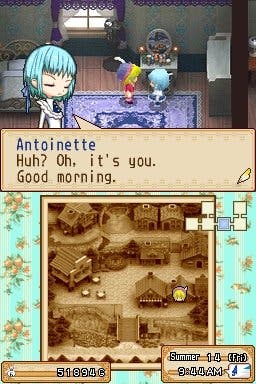Harvest Moon DS: Grand Bazaar
Bazaar creations.
It's been a while since there's been a portable Harvest Moon to rival Friends of Mineral Town, which was lodged in my GBA's cartridge slot for the whole of 2004. The series has ambled off in several different directions since, turning your farmer into a robot boy or or an island castaway or a spiky-haired amnesiac youth to spice up the process of building and tending to an agricultural empire, but it always loses something in translation. Every exciting new addition is tempered by some unnecessary annoyance, and they usually end up balancing each other out.
In this context, Grand Bazaar looks promising. You're simply a farmer, girl or boy, with a spot of land next to a small town – no caves with monsters in, no magic gems or impending disasters. You start out with a hoe, a watering can and a pack of turnip seeds, and off you scamper to tend to them until your first harvest.
But there's a huge change to this familiar scene – instead of popping your crops and produce into a box that mysteriously turns them into money, you have to sell them yourself at weekend market days, setting out a stall and ringing a bell to attract customers.
This greatly changes the rhythm of play, turning all of your attention towards the end of the week. Instead of growing as much produce as you possibly can, you have to think about how much of it you can store so that it won't go bad before the next bazaar. Instead of collecting and selling any plant or piece of twig lying around town, you have to prioritise. Cooking suddenly becomes much more important, turning two or three basic items into one valuable dish. It's just what the series has needed: a neat twist that breathes new life into familiar gameplay.

The town's prosperity is tied directly to the market's. Everybody participates in the bazaar, from the inexplicably Mexican seed-seller and his poncho-wearing brothers to the café owner who sets out cakes and coffees or the top-hatted mayor who sells chocolate. At the start, there are just a few stalls, selling essentials like seeds, cows and the occasional tool; after a few months have passed, it expands, offering more and more customers and items for sale.
Instead of staring longingly at a mayonnaise maker in the window of the local shop for months, saving up your turnip-pennies to buy it, every weekend brings a new selection of equipment, produce, seeds and cooking ingredients. It makes life a lot less predictable.
Before we throw our hats in the air and sign away our free time, though, there's a caveat. As if specifically designed to balance out the hugely positive influence of the bazaar, there's another, annoying novelty factor in the form of windmills. They're the new way of processing items, and they replace shops and expensive equipment.
Instead of buying a cheese or mayonnaise machine, for instance, you chuck milk or eggs and oil into one of the three windmills around town, and it spits out the finished article after a couple of in-game hours. Instead of visiting the blacksmith, you place your tools into the mills with valuable ores, and a few days later you've got a slightly better version.
There are over a hundred different windmill recipes, and there's a certain alchemical thrill to turning objects into other, more valuable ones, but the windmills are incredibly fiddly to use. Rather than just throwing ingredients in from your inventory, you have to scroll through every single recipe to find the one you want, and when you have to do that several times a day it becomes a ritual irritation.


